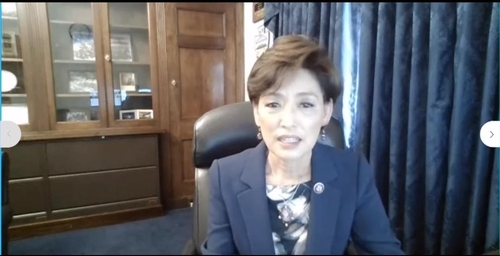 |
The captured image from a Youtube channel of the Tom Lantos Human Rights Commission shows Rep. Young Kim (R-CA) speaking in a virtual commission hearing in Washington on Thursday on South Korea's recently legislated ban on anti-North Korea leaflets. (Youtube channel of the Tom Lantos Human Rights Commission) |
A group of US lawmakers on Thursday expressed concerns over a recent South Korean law that prohibits the dispersal of propaganda leaflets to North Korea, noting the law may limit the freedom of speech of South Koreans and others working to promote human rights.
Their shared concerns were expressed at the start of a hearing hosted by a bipartisan caucus of the House of Representatives, the Tom Lantos Human Rights Commission.
The leaflets were typically flown over the border by balloon.
"Some have claimed the content of these balloons are being unnecessarily provocative as justification for outlawing their use. However, can we, in good conscience, really pay the cost of curbing free speech liberties for the sake of a regime that has no intention of offering reciprocal concessions?" Rep. Young Kim (R-CA) said in the hearing, joined by six witnesses that included a well-known North Korean human rights activist, Suzanne Scholte.
The commission, formerly the Congressional Human Rights Caucus, is a bipartisan body, formed in 1983, with a mission to "promote, defend and advocate internationally recognized human rights norms as enshrined in the Universal Declaration of Human Rights." Lantos, a longtime California congressman who died in 2008, was chairman of the House Foreign Affairs Committee.
The South Korean National Assembly passed a law in December prohibiting the dispersal of propaganda leaflets to North Korea.
Rep. James McGovern (D-MA) said he hopes the South Korean parliament would amend the law.
"Personally, I hope the assembly decides to fix the bill. Again, that's the advantage of living in a democracy. There's always a chance for a redo," he said.
McGovern noted those who support the law justify it "on security grounds" that the sending of anti-Pyongyang leaflets had long exposed South Korean residents near the inter-Korean border to physical harm.
"But the law has been widely criticized inside and outside of South Korea for suppressing speech because it appears to cover third countries, and for using vague and overly broad language," said the lawmaker.
McGovern also drew a clear line between support for free speech and what he called grievances toward South Korean President Moon Jae-in's policy of engagement with North Korea.
"To the extent that the testimony we are about to hear amounts to a political broadside against the Moon government, let me be very clear. Such assertions do not meet the standards to be considered human rights arguments, and I strongly disassociate myself from them," he said.
Rep. Christopher Smith (R-NJ) said he was alarmed by the anti-leafleting law, which he said has been referred to by others as "South Korea's democratic decay."
He noted the US too may have problems of its own when it comes to civil rights, but insisted the US and its Congress have an obligation to speak out.
"True friends point out flaws in friends' human rights records precisely out of friendship. And this principle is a reciprocal one," said Smith.
"It must also be said that the Republic of Korea is a democracy and its commitment to fundamental human rights stands in stark contrast to the Kim family's brutal dictatorship to the north in the Democratic People's Republic of Korea," he added, referring to North Korea by its official name and to leader Kim Jong-un.
The witnesses were sharply divided.
Gordon Chang, an author and North Korea expert, declared freedom was under attack in South Korea.
"I think that what we're seeing is an attempt to make the South Korean society more like the North, thereby making it easier for the unification of the two Koreas," said Chang, adding, "The overarching goal of President Moon Jae-in of South Korea is the unification of the two Koreas."
Chang also raised an issue with a separate South Korean law that prohibits slandering or distortion of a 1980 democratic movement in South Korea's southwestern city of Gwangju.
"In other words, this has been an attempt to criminalize speech. And indeed, it gives the government wide latitude to criticize critics, and all of this in the name of establishing government-determined historical truth," he said.
Others dismissed anti-Pyongyang leaflets as unnecessarily provocative, insisting they did little to promote North Korean human rights while potentially putting the families of North Korean defectors in harm's way.
"Do you think that kind of leaflet improves North Korean human rights? I often get calls (from) defectors crying, saying that their family members in North Korea are in danger because of the leaflets," said Jeon Su-mi, a South Korean human rights lawyer and chair of Conciliation and Peace Society activist group. "The propaganda leaflets have aggravated the suffering of North Koreans, instead of advancing their human rights."
Jessica Lee, a research fellow for East Asia at the Quincy Institute for Responsible Statecraft, agreed the propaganda leaflets did little to promote North Korean human rights while posing great threats to what she called fragile peace and stability on the Korean Peninsula.
"There would be little public support here in the United States for American policies that deliberately try to destabilize the peninsula, or weaken our ally South Korea," she said.
She argued empowering South Korea to promote inter-Korean reconciliation and thus reduce tension will be the best way to help advance North Korean rights.
"Replacing the armistice with a peace agreement, and empowering South Korea to meet inter-Korean reconciliation as part of an overall strategy to reduce military tensions and severely cut back, if not eliminate, North Korea's nuclear weapons program are concrete ways that the American policymakers can help advance human rights and civil liberties for all Korean people." (Yonhap)





![[Exclusive] Hyundai Mobis eyes closer ties with BYD](http://res.heraldm.com/phpwas/restmb_idxmake.php?idx=644&simg=/content/image/2024/11/25/20241125050044_0.jpg)
![[Herald Review] 'Gangnam B-Side' combines social realism with masterful suspense, performance](http://res.heraldm.com/phpwas/restmb_idxmake.php?idx=644&simg=/content/image/2024/11/25/20241125050072_0.jpg)

